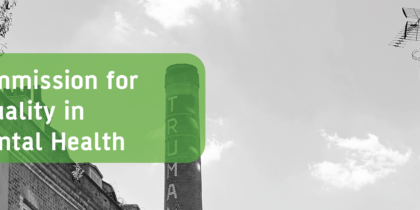The Government should take concerted action to address the unequal risk of mental ill health in the UK today, according to an independent Commission supported by Centre for Mental Health.
The Commission for Equality in Mental Health, chaired by Liz Sayce, is carrying out a two-year investigation and today publishes its first major briefing paper.
The briefing explores why some groups of people have a much higher risk of mental ill health than others and what can be done to reduce the disparities.
The briefing finds that mental health inequalities are closely linked to wider injustices in society. Inequalities in wealth, power and voice are linked to poorer mental health. Exclusion, discrimination, violence and insecurity all increase our risk of poor mental health and explain why some groups of people face markedly higher rates of mental ill health than others.
The briefing explores actions that can be taken, from communities and local services to national policies, to reduce mental health inequalities. They include action to reduce income inequality, housing insecurity and poor working conditions as well as changes to education and the provision of early years support to families.
Liz Sayce said: “Anyone can have a mental health problem, and many of us will during our lives. But our risk of mental ill health is anything but equal. Children from the lowest income families are four times as likely as the wealthiest to have poor mental health by the time they leave primary school. Disabled people and people with physical health problems have far higher rates of mental ill health, not least because they disproportionately experience poverty, isolation and disconnection from their communities.
“The causes of mental health inequalities are complex. Women face higher risks of mental ill health for many reasons, including the far higher risk of experiencing abuse and violence at home. For LGBT+ communities, discrimination and bullying are major factors in the much higher rate of psychological distress. And for Black, Asian and minority ethnic communities in the UK, racism and oppression are at the heart of the high levels of distress that affect many. #“For too long we have accepted that inequalities in mental health are inevitable. They are not. We can take action at every level, from local communities to national policies, to reduce mental health inequalities. Our first briefing paper looks at what we can do to make a difference. Ideas shared with the Commission include action to reduce child poverty and homelessness, inclusive education as part of a ‘whole school approach’ to mental health, and the provision of early years interventions such as parenting programmes.
“The Commission will produce two further briefing papers on access to mental health support and on outcomes. In our final report later this year we will make recommendations for how to build a system designed for equality.”
Centre for Mental Health chief executive Sarah Hughes said: “The Commission’s first briefing paper demonstrates beyond doubt that inequality is toxic to our mental health. Deep and entrenched inequalities and stark injustices create profound and enduring risks that have and will continue to create highly vulnerable groups and communities for generations. We can start taking action now to turn this around, addressing inequality is the biggest yet most important challenge of our time.
“The Government pledged in its election manifesto to take action to reduce health inequalities and to focus on preventing health problems. It is realising this promise that we believe will have the biggest and most positive impact on health. Government commitments to invest in schools, regenerate towns, level up opportunities and continue efforts to reduce poverty, including child poverty, could also make a critical difference to reducing inequalities in mental health. We very much see our role as helping move this agenda forward in ways that help achieve greater mental health equality.
The Commission sets out some of the steps that will be necessary to fulfil that mandate, we know that by taking a cross-government approach to reducing inequalities we will prevent mental health difficulties which will inevitably contribute to a thriving society.”





